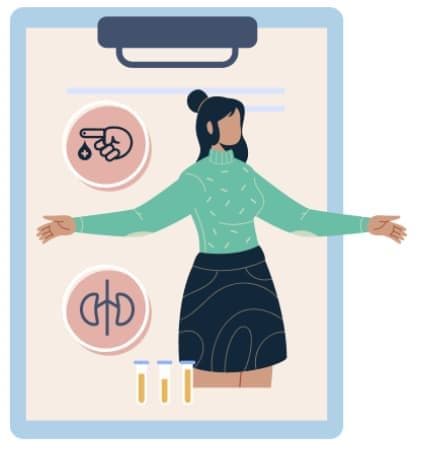This article is compiled by Sanjana Varma, a freelance writer of Proactive For Her.
What causes kidney disease?
The main function of the kidneys is to filter blood. They get rid of extra fluid and waste from our bodies through urine. Diabetes has a direct impact on your kidneys. High blood sugar damages tiny filters and small blood vessels in your kidneys. These damages impair the function of the kidney which leads to leaks and closing down of the kidney gradually. The first sign of kidney damage is detected when there is an abnormal amount of protein in your urine.
Symptoms of kidney disease
The early stages of kidney diseases are usually asymptomatic visually. Regular testing for kidney disease can help get early treatment and slow down the progress of the disease.
If kidney disease progresses, you could notice symptoms like:
- Swollen ankles, feet and hands due to water retention
- Shortness of breath
- A metallic taste in the mouth
- Nausea or vomiting
- A poor appetite.
- Tiredness/weakness
- Weight loss.
- Dry, itchy skin.
- Muscle cramps.
- Puffiness around the eyes.
- Needing to pass urine more often than usual.
These symptoms are very likely to be caused because your kidneys are struggling to clear extra fluid and waste from your body. But these symptoms can also be caused by other conditions, so it’s important to talk to your doctor for more information and advice.
How does diabetic kidney disease develop and progress?
Diabetic kidney disease is usually diagnosed when the level of albumin (protein) in the urine is high. Urine tests are part of the routine checks that are prescribed to people with diabetes to help detect the amount of albumin.
In normal healthy kidneys, only a tiny amount of albumin is found in the urine. A raised level of albumin in the urine is the typical first sign that the kidneys have become damaged by diabetes.
Diabetic kidney disease is divided into two main categories, depending on how much albumin is lost through the kidneys:
- Microalbuminuria: in this condition, the amount of albumin that leaks into the urine is between 30 and 300 mg per day.
- Macroalbuminuria: in this condition, the amount of albumin that leaks into the urine is more than 300 mg per day.
A blood test can also help show how well the kidneys are working. The blood test measures the level of creatinine, which is normally cleared from the blood by the kidneys. If your kidneys are not working properly, the level of creatinine in the blood goes up; usually later on in the disease.
How can I reduce my risk of kidney disease?
You can reduce your risk of developing kidney disease by:
- Keeping your blood sugar (glucose) levels within your target range
- Keeping your blood pressure down
- Get support to stop smoking
- Limit salt intake
- Eat healthily and keep active
- Go to all your medical appointments.
- Avoid certain medications
Treatment
The type of treatment you need will depend on the stage of kidney disease. It’s very important to keep your blood pressure under control to stop kidney disease from getting worse.
The available methods of treatment include:
- Tablets to stabilize kidney functions
- Follow proper diet after consulting a dietician
- Dialysis and Kidney transplantation in severe cases
The good news is, with prompt diagnosis and expert treatment and regular follow-ups, fewer people will go on to develop late-stage kidney disease. Although Diabetic kidney disease is more common in people with type 1 diabetes, there are more people with type 2 diabetes and diabetic kidney disease. This is because type 2 diabetes is much more common than type 1 diabetes.
The Bottom Line
Diabetic kidney disease is the most common cause of kidney failure. It is much more common in Asian and Black people with diabetes than in White people.
You are unlikely to have symptoms of early diabetic kidney disease. Symptoms tend to develop when the kidney disease progresses. The symptoms at first tend to be vague and nonspecific, such as feeling tired, having less energy than usual and just not feeling well.
As the kidney function declines, various other problems may develop - for example, anaemia and an imbalance of calcium, phosphate and other chemicals in the bloodstream. These can cause various symptoms, such as tiredness due to anaemia, and bone 'thinning' or fractures due to calcium and phosphate imbalance. End-stage kidney failure is eventually fatal unless treated.
The key is prevention! Diabetic patients must get regular screening for diabetic nephropathy. Simple lifestyle changes and medications can help keep your kidney function healthy.
Disclaimer: This information is provided for educational purposes and should not be construed as medical advice. Please consult with your healthcare practitioners before undertaking any changes in your diet or adding supplements.
Proactive For Her is a digital clinic for women, offering accessible, personalized, and confidential healthcare solutions. We offer products and services for out-patient health concerns of Indian women, across their lifetime - from puberty to pregnancy to menopause. To know more about the sexual and reproductive health of women, visit https://www.proactiveforher.com/

